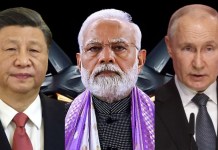As the Taliban looks to regain power in Afghanistan, Jihadi groups in Kashmir seem to be in a jubilant mood to revive the militancy in Kashmir? After the USSR withdrew from Afghanistan in 1988-89, the Taliban fighters were re-directed to fight in Kashmir on behest of Pakistan which created massive unrest in the Valley and led to the massacre of the minority community. Will the history repeat itself after the US pullout? A EurAsian Times analysis.
Why Both India and Pakistan Reject Complete Independence For Kashmir?
Lashkar-e-Taiba(LeT) head Hafiz Saeed who is also the chief of Jama’at-ud-Da’wah (JuD) had taken part in a rally as part of the so-called Kashmir solidarity day in Lahore. JuD is a UN-designated terrorist organisation with a $10 million dollar bounty by the US on its founder Hafiz Saeed. JuD is a UN-designated terrorist organisation with a $10 million dollar bounty by the US on its founder Hafiz Saeed.
In the rally, Hafiz Saeed seems to have been emboldened by the possibility of Afghan Taliban coming back to power. He stated that if the super-power US can be forced Afghanistan, then India will be kicked out from Kashmir too.
India has strongly raised the matter of 26/11 mastermind Hafiz Saeed’s rally in Lahore on 5th February. India sent a note verbale to Pakistan on 6th of February, a day after the rally happened in Pakistan.
India Responds To Taliban Threats
Lt Gen Ranbir Singh said that Army was fully prepared to meet with any contingency if militants tried to infiltrate into Jammu and Kashmir following troop pullout from Afghanistan. Singh declared that the Indian Army is totally apolitical and was conducting counter-insurgency operations in the State in a professional manner and morale of the troops can’t be affected by some statements.
The Indian Ministry of External Affairs to Pakistan High Commission India registered its “strong protest at the continued use of Pakistan controlled territory by extremist and terrorist elements” to “freely propagate and promote violence and terror against India.” Further, India “once again” called upon the “government of Pakistan to fulfil its international obligations” and “abide by its bilateral commitment to not allow any territory under its control to be used for terrorism against India in any manner”
India has been raising the issue of Hafiz Saeed roaming freely in Pakistan number of times. Last year at the United Nation, India slammed Pakistan for its support to terror & asked how is that a “UN-designated terrorist Hafiz Saeed enjoys a free run inside Pakistan and spews venom and sets up candidates for electoral office?”
Despite Islamabad saying it wants peace with India, Pakistani ministers have been sharing the dais with Hafiz Saeed. On 30th September 2018, Pakistan’s Religious Affairs and Inter-faith Minister Noor-ul-Haq Qadri had shared a platform with Hafiz Saeed, with both making anti-India statements. In December 2018, a video surfaced in which Pakistan’s Minister of State for Interior Shehryar Khan Afridi had openly expressed the support of current Pak government to Hafiz Saeed and his organisation.
What Do Experts Say?
According to experts talking to EurAsian Times, the situation in 1989 and 2019 is very different. India was not well prepared to tackle the cross border infiltration and rising insurgency in the Kashmir Valley back then. The border management mechanism in 1989 was strong, but today, the borders have been virtually been sealed by man, machine and technology. Any cross border infiltration is now nearly impossible and any attempts to do so will only result in humongous losses for the infringing party.
India-Pakistan Dialogues Only Solution To Settle Kashmir Issue: Shah Faesal
Secondly, if the Taliban do end up sharing power in Afghanistan, it will not be without a guarantee that they will not indulge in terror activities or host, promote or sponsor any terror groups on their soil. The Taliban fighters may end up being part of the Afghan National Army and there would be no incentive to infiltrate into India.
Lastly, if the Taliban end up seizing power in Afghanistan, which is likely to be on a shared basis, will have their own independent policy, and eventually may sway away from Pakistan and move towards economically progressive India. Historically, India-Afghan relations have been strong and being one of the biggest investors in Afghanistan, India will eventually get on friendly terms with the Taliban as well. The history has absolutely no chance of repeating itself, this time.
More News at EurAsian Times
- Indian Military Base in Vietnam To Protect Hanoi’s Territorial Interest
- Indian Military Base in Sabang can Strangle China at the Strait of Malacca
- Saudi Money, US Weapons, Israeli Intelligence Fuelling Arab NATO – Iran
- Will Ayni Airbase in Tajikistan Become India’s 1st Overseas Military Base?
- Indonesia Opens Another Military Base at Natuna Islands To Counter Aggressive China





